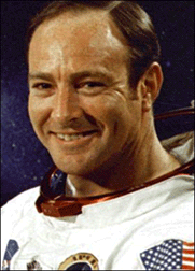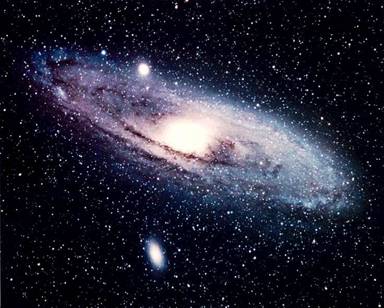"Look up at the stars, not down at your feet. Be curious." Stephen Hawking at the 2012 Paralympics in London.
While there appears, at times, a collective view from our species that the Sun did not start to shine until the first human bent over - surprisingly, that is not the case.
If we could lift our collective gaze above the rooftops of Western Sydney, and even, dare it be said, beyond the iron ore deposits of Western Australia, we would gain a great deal of perspective about the Earth, its place, and ours, in the Universe.
The testimonies of the astronauts who saw the Earth from a great distance can help us gain that perspective.
Our home
Earth as seen from the Moon
Neil Armstrong Apollo 11 "It suddenly struck me that that tiny pea, pretty and blue, was the Earth. I put my thumb up and shut one eye, and my thumb blotted out the planet Earth. I didn't feel like a giant. I felt very, very small."
Scott Carpenter Mercury 7 "The planet is not terra firma. It is a delicate flower and must be cared for. It's lonely. It's small. It's isolated, and there is no resupply. And we are mistreating it. Clearly, the highest loyalty we should have is not to our own country or our own religion our own hometown or even to ourselves. It should be to, number two, the family of man, and number one, the planet at large. This is home, and this is all we've got."
Frank Borman Apollo 8 "When you are finally up on the Moon looking back on Earth, all those differences and nationalistic traits are pretty well going to blend, and you're going to get a concept that maybe this really is one world and why the hell can't we learn to live together like decent people?"
"I think the one overwhelming emotion we had when we saw the Earth rising in the distance over the lunar landscape.....It makes us realise that we all do exist on one small globe. For from 230,000 miles away it really is a small planet."
Michael Collins Apollo 11 "How peaceful and calm and quiet and serene it looked, and how fragile it appeared. That was, oddly enough, the overriding sensation I got looking at the Earth was, my God, that little thing is so fragile out there."
"After the flight of Apollo 11, the three of us [Neil Armstrong, Buzz Aldrin & Michael Collins] went on an around the world trip. Wherever we went people, instead of saying 'You Americans did it', everywhere they said 'We did it! We humankind. We the human race. We people" I'd never heard people in different countries use this word 'we, we, we' as emphatically as we were hearing from Europeans, Asians, Africans, where ever we went it was 'We finally did it!' I thought that was a wonderful thing."
Charles Duke Apollo 15 "I was able to look out the window to see this incredible sight of the whole circle of the Earth. Oceans were crystal blue, the land was brown and the clouds and snow were pure white, and that jewel of the Earth was just hung up in the blackness of Space. The only people who have seen the whole circle of the Earth are the 24 guys who've been to the Moon."
Gene Cernan Apollo 10 and 17 "In Earth orbit the horizon is just slightly curved. When you head on out to the Moon, in very short order, and you get a chance to look back at the Earth, that horizon slowly curves around in upon itself and all of a sudden you are looking at something that is very strange, yet very familiar, because you are beginning to see the Earth evolve."
Edgar Mitchell Apollo 14 "When you see the Earth like that it's powerful. Not any bigger than that [thumb size] way up there. You get to see the Earth receding and you get to see the Moon coming towards you and it's awe inspiring"
"The biggest joy was on the way home in my cockpit window every two minutes, the Earth, the Moon and the Sun, and the whole 360 degree panorama of the heavens and that was a powerful, overwhelming experience. And suddenly I realised that the molecules of my body, and the molecules of the spacecraft, and the molecules in the bodies of my partners were prototyped, were manufactured, in some ancient generation of stars. And that was an overwhelming sense of oneness, of connectedness, it was not 'them and us' it was 'that's me' 'that's us'. It was accompanied by an ecstasy, an epiphany, an insight, a sense of 'Oh my God! Yes!'"
"You develop an instant global consciousness, a people orientation, an intense dissatisfaction with the state of the world and a compulsion to do something about it. From there out on the Moon, international politics look so petty. You want to grab a politician by the scruff of the neck and drag him a quarter of a million miles and say 'Look at that, you son of a bitch!'"
Jim Lovell Apollo 8 and 13 "We learnt a lot about the Moon but what we really learnt was about the Earth. The fact that from the distance of the Moon you can put your thumb up and hide the Earth behind your thumb. Everything that you have ever known, your loved ones, your business, the problems of the Earth itself - all behind your thumb - and how insignificant we really all are. But also how fortunate we are to have this body and to be able to enjoy living here amongst the beauty of the Earth itself."
Dave Scott Apollo 9 and 15 "It truly is an oasis, and we don't take very good care of it. The elevation of that concern is a real contribution to saving the Earth."
John Young Apollo 10 and 16 "Earth has changed a lot since we started flying Gemini [1962 - 1966]. A lot of things like urban pollution - and you can see that when you fly in orbit now - you can see the big cities all have their unique set of atmospheres, they really do. We ought to be looking out for our kids and our grandkids, and what are we worrying about? The price of a gallon of gasoline. That's awful."
Further perspective
The Earth, our home, is just one small planet in a planetary system of nine (plus about two million asteroids and about one trillion comets) that revolve around the Sun.
Our Sun (in which you could fit about 1.3 million Earths) is just one rather small star in the Milky Way galaxy, as this comparative chart of planets and stars shows.
Our Sun is just one star in the Milky Way galaxy that consists of about 400 billion other stars.
Our home galaxy, the Milky Way, is part of a local group of 54 galaxies.
Our local group of galaxies are just 54 in a Universe that consists of about 100 billion other galaxies.
All these other galaxies are moving away from us at a rapid rate except for Andromeda (consisting of about 1 trillion stars) which should collide with the Milky Way galaxy in four billion years from now.
The ultimate perspective
Scientists have estimated there are about 10 stars in the Universe for every single grain of sand on the entire planet Earth.
"Look up at the stars, not down at your feet."

































Andrew, you never fail to make me turn my own personal kaleidoscope. Thanks for giving me back what is real. Perspective.
ReplyDeleteThank you, Josephine. I hope your students enjoy reading it.
ReplyDelete